The French healthcare system is renowned for being of high quality. A national treasure – if you will – of which this country is, very proud. But unlike the UK, French healthcare comes at a cost. For non-residents, it is important not only to understand how the system works but also what coverage they should have before visiting the country.
The French healthcare system boasts of providing high-quality universal coverage to all, regardless of age and economic situation. In 2021, France was cited by the World Health Organization as being the best provider of healthcare in the world. It has more doctors per capita and hospital beds than the US, which is impressive considering the USA is about 18 times larger.
The system consists of a network of doctors, hospitals and specialists, both public and private. However, it does come at a price. While French citizens and residents of the country both pay into the system to benefit, visitors cannot. Healthcare costs for French residents are covered by a combination of state contributions and patient contributions alongside private medical insurance.
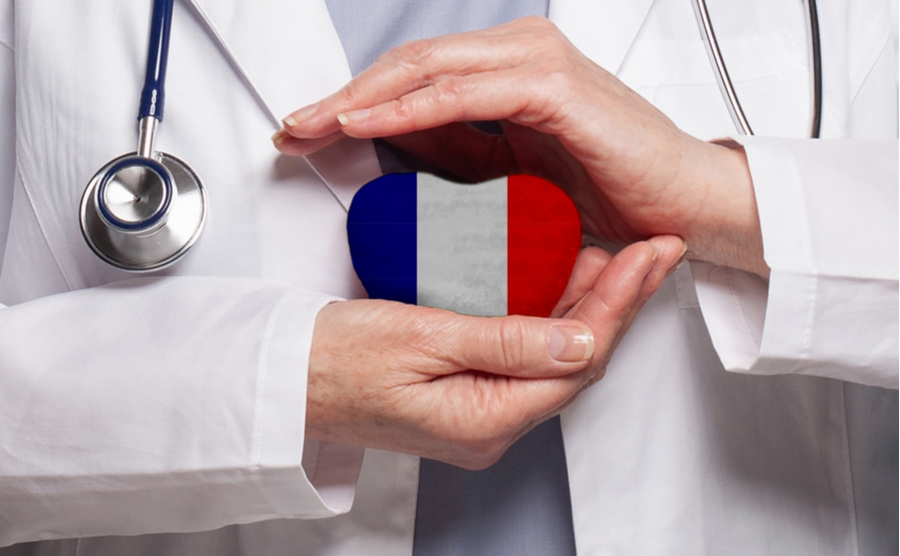
French doctor holding heart with flag of France background.
If you fall ill in France
If symptoms are mild but you need medication, you should find a local doctor’s office and make contact with them. This is always advised first, rather than simply showing up. Should the problem arise out of hours, contact the “médicin de garde” (doctor on call) on 116 117.
In the case of more severe symptoms, you should contact the SAMU using telephone number 15. They deal with urgent and emergency medical callouts. It is worth noting that you, in the case of non-French speakers, dial 112 for an English-speaking emergency service. Then, request an ambulance.
Should you need a hospital and be able to make your own way there, the department to head for upon arrival is “urgences” (emergencies).
Find homes in France via our property portal.

How do you pay for healthcare in France?
How do I pay for treatment?
The French healthcare system operates under a reimbursement process. You pay for all treatment upfront and apply for reimbursement afterwards. This is the way the system works for French nationals too. Although paying contributions and private medical insurance often helps ensure prompt and automatic reimbursement.
How much does healthcare cost? Well, doctor’s appointments are very affordable at around 25 euros, but any further treatment can quickly mount up.
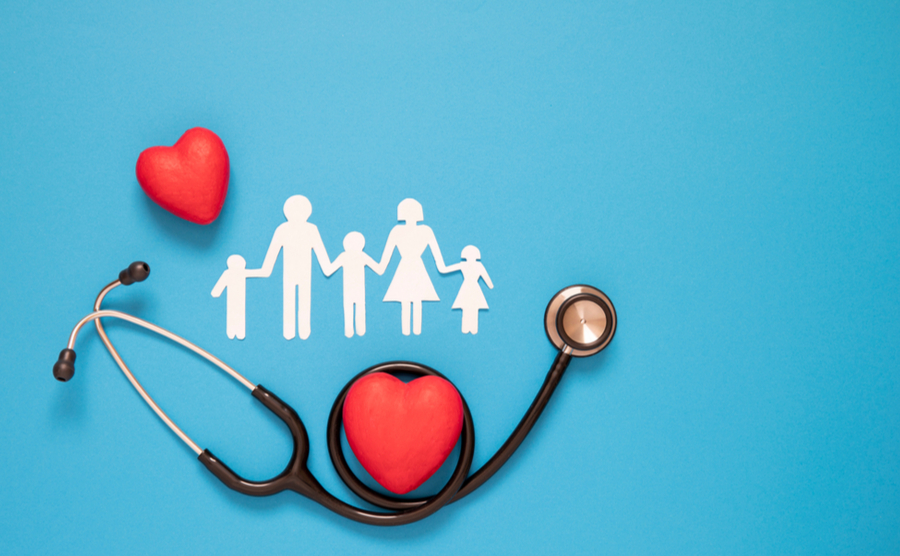
A stethoscope and a family image
Cover for visiting France
It is very important that when visiting France as a non-resident, you protect yourself with adequate proof of cover for state-provided medical treatment. In the past, this was facilitated through the issue of EHIC cards. A word of warning though. If in possession of an EHIC card which is still valid, the UK government’s advice is that this will suffice. If not, you will now need to seek out a GHIC (a Global Health Insurance card). Another consequence of Brexit and the UK leaving the EU.
Be aware that the card providing assured state cover for French healthcare whilst visiting, should not be solely relied upon. While covering some French healthcare costs, this alone, will not provide cover for other potential costs. This may include ongoing medical treatment, urgent repatriation or even non-urgent treatment. For this reason, it is always advisable to purchase appropriate and trusted travel insurance according to your specific needs to ensure peace of mind. The last thing anyone wants in an emergency is to find out that they are not sufficiently covered, adding to already elevated stress levels.
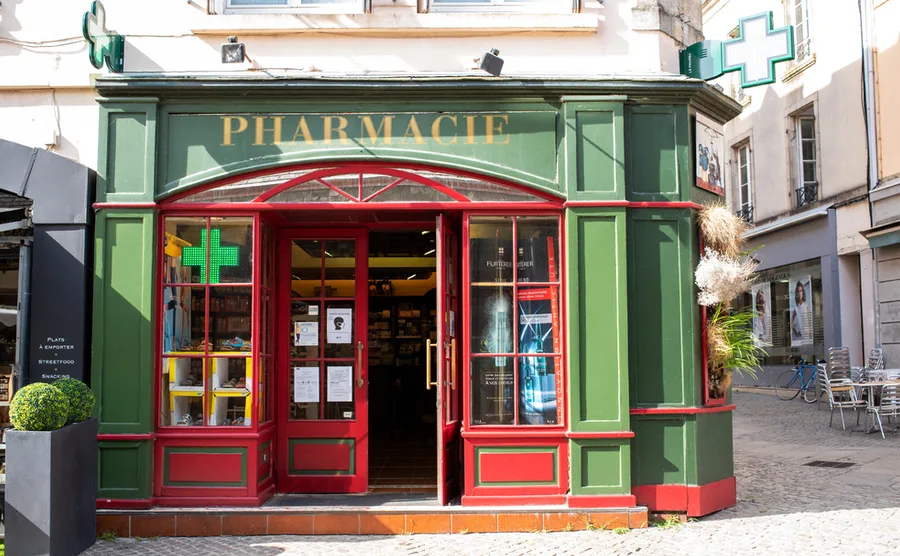
Pain killers can only be bought in pharmacies in France I Image: Rosanne de Vries via Shutterstock
Prescriptions in France
Over-the-counter medication is a strictly controlled business in France. Even non-prescription medication for headaches and sore throats is highly monitored. One thing you’ll notice is that paracetamol and cough syrup isn’t available in supermarkets or shops. They are only sold in pharmacies and must be collected by a pharmacist (aka not on open shelves for you to grab). This is France’s way of preventing potential problems of over-medication.
Should you require specific medication via prescription during your stay in France, do ensure that you come armed with that prescription/ Otherwise, you will require a doctor’s visit as well as a French prescription prior.
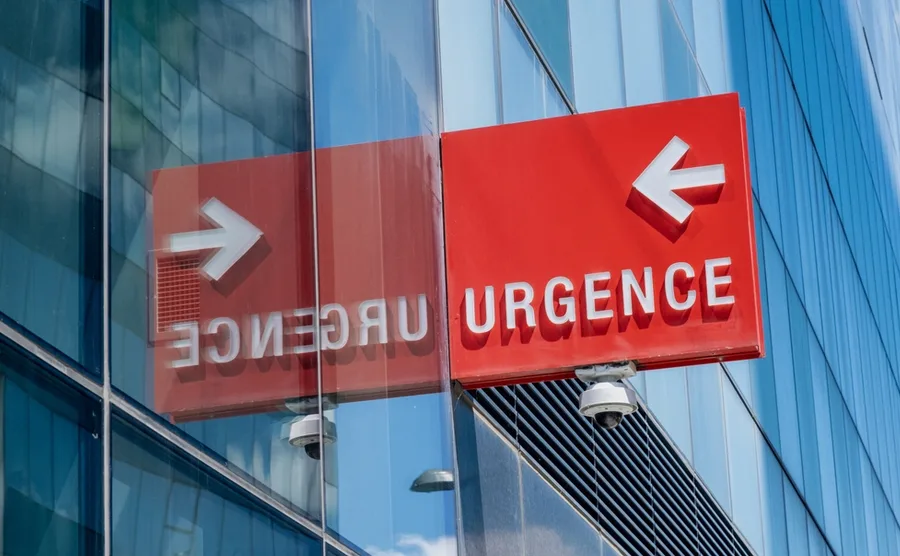
Urgence departement / Emergency department
Benefits of the French healthcare system
Something that may surprise those of us who are used to the NHS, is that the cost of French healthcare may have its advantages. Lots of people who now live here find themselves surprised not only by the quality of French healthcare but also by the sheer speed of service. That goes for doctor’s appointments, hospital and specialist appointments.
A benefit of French healthcare is that it’s very much focused on prevention, rather than cure. Proactivity takes centre stage for healthcare providers. Upon initial registration at a doctor’s surgery, with notes and history in hand or not, a full healthcare check is routinely performed. The likes I have never experienced at a doctor’s surgery in the UK. Furthermore, screening for certain conditions appears in some cases to start at earlier age brackets. As just one example, colorectal cancer screening for the general population starts in France at age 50, as opposed to 60 in the UK. France is also one of the few countries to recommend skin cancer screening. Also, in part thanks to routine screenings by the Institut National du Cancer, the average waiting time from diagnosis to starting treatment is typically less than six weeks.
It is also worth noting that having private healthcare, means that on occasion you will be invited to a full health check. Fully covered, of course by the costs of that insurance.
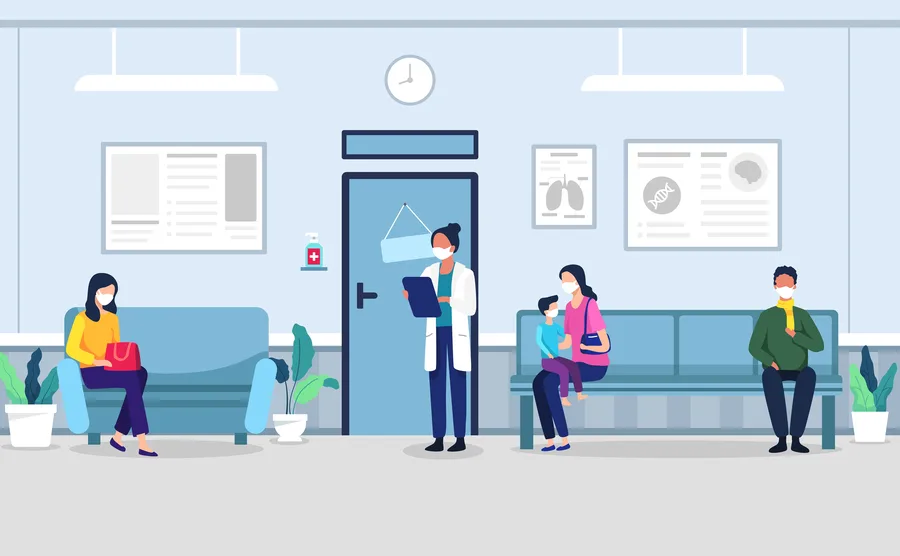
illustration depicts patients waiting at a doctor’s surgery
The future of French healthcare
The French healthcare model is built to fundamentally weather the storm. While is true that in rural areas, that some services are starting to experience longer waiting times than they are used to. It is however noteworthy that often people who relocate to France, when asked about the biggest benefits of this country, respond with “change of lifestyle” and “healthcare”. And perhaps, the fact that both are often cited, is by no means a coincidence.










